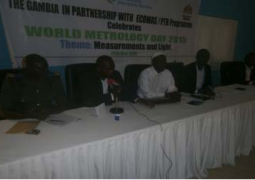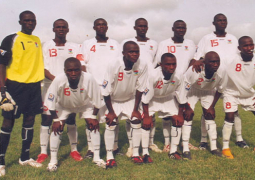The Gambia government on 26 March 2013 signed a four-year Memorandum of Understanding (MoU) on social protection with the United Nations agencies in the country.
The signing ceremony was held at the Ministry of Health and Social Welfare’s conference hall in Banjul.
The parties in the partnership agreement included the Ministry of Health and Social Welfare, the Ministry of Finance and Economic Affairs, the Ministry of Trade, Industry, Regional Integration and Employment, UNICEF, the UNDP, UNAIDS, WFP, ILO and the IMF.
Speaking at the signing ceremony, Dr. Babagana Ahmadu, acting-UN Resident Coordinator in The Gambia, on behalf of the UN systems in the country, expressed delight at the partnership.
He described the event as very important and the first of its kind in the history of The Gambia.
According to him, when so many partners unite with the intention to develop, introduce and integrate inclusive social protection systems the outcome would no doubt pay well for the country.
He stated that social protection programmes mitigate the risks and also help in tackling the various shocks faced personally and as communities.
“They support vulnerable and marginalized groups; tackle immediate problems of poverty; social exclusion, hunger and malnutrition; and improve resilience of the population,” he said.
Dr. Ahmadu noted that social protection systems have the potential to contribute to the realisation of basic human rights, such as the right to food, education and health, and to combat systematic inequity and inequality.
He paid tribute to The Gambia government for recognising these issues and spelling them out in the Vision 2020 and the 2012-2015 Program of Accelerated Growth and Employment (PAGE), as well as in the 2012-2016 UN development assistant framework of the UNDAF.
The FAO country boss hailed the country for setting up the national social protection steering committee in 2012 and reaffirmed UN’s commitment in supporting The Gambia in that regard.
For his part, Matilda Bouy, the Permanent Secretary at the Ministry of Health and Social Welfare, said the subject of social protection is a growing area of research and policy as many countries in the developing world grapple with challenges of reducing inequality, inequity, poverty, vulnerability and achieving growth.
“It suffices therefore to mention that the social protection dialogue and cooperation, stipulated by the MoU we are signing today, could not have come at a better time than now,” she said.
She also stated that the social protection policies and programmes should help to bridge the gap between needs and services.
According to her, social protection systems reduce key risks and break inter-generated cycles of poverty and vulnerability, adding that the main question to consider is whether achieving it lies in technical, political and economic or even sociological interventions.
It is now critical to focus on all those challenges and address institutional, governance, and financial constraints in delivering social protection programmes, she said.
Madam Fanta Bai Secka, Director of Social Welfare and a member of the National Social Protection Committee (NSPC), said social protection systems are a public policy and private programmes, aimed at reducing and eliminating economic and social vulnerability to poverty alleviation.




